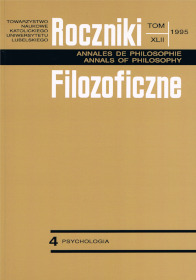Psychiatria spirytualna − wprowadzenie i próba oceny
Abstrakt
In March 1994 in Lyon, France, was founded the International Association of Spiritual Psychiatry (IASP). Spiritual psychiatry is a medicine of the human psyche that fully integrates the spiritual quest of each individual who faces psychical problems, using a therapeutic approach. Each human being seeks happiness. Initially, they think they can find it in the external world (consumerism, work, power, relationships), then once they discover that they still have not found what their looking for, they revert back to the internal realm in order to understand that this sought-for happiness is already present. In the past, psychology and psychiatry had been separated from spirituality leaving the patient to choose from contradictory means. The association was established as a reaction to excessive mechanization and materialism of present day psychiatry that seems to have forgotten the essential. Currently, the IASP is made up of approximately 150 members from five continents. They are for the most part psychiatrists, psychotherapists, psychologists and specialists in alternative medicine. The number of participants and their geographic diversity is rapidly increasing. This expansion is due to the fact that a general need exists for the public, and therapists themselves, to introduce a psycho-spiritual medicine of merit.
The IASP is based principally on Buddhist and Vedantic traditions. The purpose of this paper is to supplement spiritual psychiatry with the Christian faith.
Bibliografia
American Psychiatric Association.: Diagnostic and Statistical Manual of Mental Disorders. Washington, DC, 1987. Third Edition Revised.
Bancroft A.: Współcześni mistycy i mędrcy. Tłum. M. Kuźniak. Warszawa 1987.
Frankl V. E.: Psycholog w obozie koncentracyjnym. Tłum. S. Zagórska. Warszawa 1962.
Fenner P.: Intrinsic Freedom. Millennium Books. Australia 1994.
Fenner P.: Dismantling Ego Fixation: an Introduction to Deconstructive Contemplation. [Materiały konferencyjne IASP]. Paryż 1995.
Grof S.: LSD Psychotherapy. Pomona−Calif 1980. Hunter House.
Grof S., Grof C.: Beyond Death: the Gates of Consciousness. London 1980. Thames & Hudson.
Harding D. E.: On Having No Head. Zen and the Rediscovery of the Obvious. England 1986. Arkana.
Harding D. E.: The Little Book of Life and Death. England 1988. A Penguin Book.
IASP NEWS − AUTUMN 1994.
IASP NEWS − SPRING 1995.
Kashtan B.: Diverse Faces of the Ego and Their Relationships to Suffering. [Materiały konferencyjne IASP]. Paryż 1995.
Mantel J. M.: Who Suffers? [Materiały konferencyjne IASP]. Paryż 1995.
Mantel J. M.: The Sacred in Psychology and Psychopathology. [Materiały konferencyjne IASP]. Paryż 1995a.
Pattison E. M. i in.: Trance and Possesion States. W: B. B. Wolman, M. Ullman (eds.). Handbook of States of Consciousness. New York 1986, s. 283-310. Van Nostrand Reinhold Company.
Putnam F. W.: Diagnosis and Treatment of Multiple Personality Disorder. New York 1989. The Guilford Press.
Séguy M. Q.: What if Suffering Does not Exist by „itself”? [Materiały konferencyjne IASP]. Paryż 1995.
Shapiro D.: Judaism as a Journey of Transformation: Consciousness, Behavior and Society. „The Journal of Transpersonal Psychology” 1989 vol. 21 no.1 s.13-59.
Weil P.: L'Homme sans frontieres. Paris 1992. L'Espace Bleu.
Weil P.: Psychotherapy: from Personal to Transpersonal. [Materiały konferencyjne IASP]. Paryż 1995.
Zalewski G.: Konstruktywne i destruktywne stany świadomości. Zmatematyzowany model świadomości i samoświadomości. „Przegląd Psychologiczny” 1990 nr 3 s. 507-519.
Zalewski G.: Psychologiczne modele świadomości i samoświadomości. Białystok 1992. Dział Wydawnictw Filii UW.
Zalewski G.: Psychologiczna analiza obłędu. Białystok 1994. Dział Wydawnictw Filii UW.
Zalewski G.: Model integrujący zwyczajne, odmienne i psychotyczne stany świadomości. „Przegląd Psychologiczny” 1994a nr 1-2 s. 93-103.
Copyright (c) 1995 Roczniki Filozoficzne

Utwór dostępny jest na licencji Creative Commons Uznanie autorstwa – Użycie niekomercyjne – Bez utworów zależnych 4.0 Międzynarodowe.





